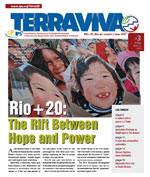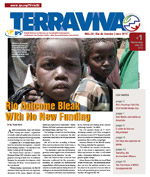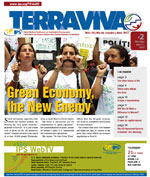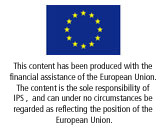By Don de Silva*
RIO DE JANEIRO, Jun 22 (TerraViva) I disagree with the branding of Rio+20 as an abject “failure”. As a returnee from the 1992 Earth Summit, I have mixed views about the conference, some positive.
Even former political leaders have joined the chorus of disappointment.
Gro Harlem Brundtland, former prime minister of Norway, has said, “The Rio+20 declaration does not do enough to set humanity on a sustainable path, decades after it was agreed that this is essential for both people and the planet. I understand the frustration in Rio today.”
Mary Robinson, former president of Ireland has said: “This is a ‘once in a generation’ moment when the world needs vision, commitment and above all, leadership. Sadly, the current document is a failure of leadership.”
Both world renowned and distinguished leaders raise important points. But blame and finger-pointing comes easy.
Are the civil society movements so blasé as to expect governments, many with scant respect for human rights or the environment, to suddenly come up with radical agreements and then cough up the billions to implement action?
Did they not look into what happened immediately after the creation of the U.N. Environment Programme (UNEP) in 1972? Or the follow-up to the 1992 Rio summit?
According to British government records unearthed by the New Scientist, the ambitious aims of UNEP were held in cheque by the activities of the Brussels group, which included Britain, the U.S., Germany, Italy, Belgium, the Netherlands and France, while they piously preached about the environment.
The group was “an unofficial policy-making body to concert the views of the principal governments concerned”, according to a note of one of the group’s first meetings, held in 1971, written by a civil servant in the British Foreign and Commonwealth Office.
Instead of making generalised statements damning all countries, is it not possible for the members of the civil society groups and concerned leaders to name and shame those who have watered down texts, and strengthen the hand of negotiators who wanted to effect change?
At a fringe meeting, Gro Harlem Brundtland lamented the omission of women’s reproductive rights in the final document. It is surprising that the full force of the civil society movement was not mobilised to stop this from happening.
Holier-than-thou non-governmental organisations need to turn the searchlight inwards to see if they are really the paragons of virtue they claim to be. Getting two environmental NGOs to work together at times is a daunting task. Some are neither civil nor societies, and can be “some peoples’” movements.
At Rio+20, businesses came of age. An “extraordinary” group of leaders, calling themselves “Friends of Rio”, from across business, NGOs, trade unions and scientific institutions have banded together to find a new path towards sustainable development.
Their message is pretty clear: we cannot leave the future of the planet only to politicians.
Failure of leadership? The 2010 United Nations Conference on Climate Change (COP16), which took place in Copenhagen, was a political disaster. By contrast, Rio+20 has produced an agreement, a combined effort of the passionate and plain-speaking Sha Zukang, secretary general of Rio+20, and the Brazilian government.
Rio+20 has witnessed the emergence of a new leadership from countries like Brazil and China. Yes, polluters must pay for past and present inequities. But developing countries will have to wait forever if they think that the debt-ridden, austerity-laden Western nations will put up the money.
To argue about a lack of funds is laughable. In 2011, global military spending amounted to 1.74 trillion dollars. Disarmament is a necessary condition for sustainable development. This spending is not mentioned in the final text.
Some 50,000 protesters in Rio claimed that the green economy is a wolf in sheep’s clothing. This need not be the case. The shift to a green economy can be used to bring paradigm shifts in thinking and living, beyond anything that we have witnessed so far.
A relentless and sustained united action by thousands of environmental NGOs throughout the world – a green Spring, Summer, Autumn and Winter – will and can move mountains.
Don de Silva is a journalist and environmentalist. He is co-ordinator of UNEP’s Regional Information Programmes and has worked with several NGOs to initiate and manage advocacy programmes for sustainable development. He can be contacted at dondes@changeways.net








 Add to Google
Add to Google







